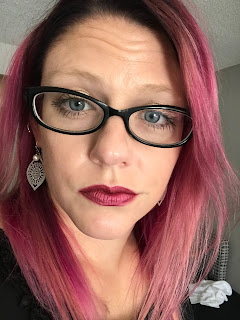March is Our Month
Did you know that March is Endometriosis Awareness Month? Probably not. I have the disease, and I only learned a few months ago that "Endometriosis Awareness Month" was a thing. So, instead of my weekly bitchfest, I'm going to hit you with some facts that are definitely not fake news.
Until next week.
Yours,
Test Subject 521-002
P.S. If you feel called to help, please consider making a donation to the Endometriosis Foundation of America (Endofound), which is "committed to funding landmark endometriosis research and supports research that embraces the pertinent and important topics that cover the social impact of endometriosis as well as looking at the cellular and molecular make-up of the disease. Research is important because it helps the medical community to understand the sub-types of endometriosis; something that will assist in developing better treatment strategies. Endofound gives significance to research projects that are utilizing innovative methodologies, have research objectives that aim to significantly advance the scientific community’s understanding of the disease, and have a strong record of producing impactful studies that influence the clinical care and overall health outcomes of those facing endometriosis."
You can donate here: https://www.endofound.org/donation.
P.P.S. If you want to read more, here are some links:
- An estimated 176 million women worldwide have endometriosis. If all of us combined to form our own country, we could form the 8th largest country in world. According to the U.S. Census Bureau's Current World Population, we'd fall right between Nigeria and Bangladesh, outnumbering even Russia and Japan. What a country that would be, right? Lookout, World, we're coming for you.
- Endometriosis is an equal-opportunity employer. It does not care about your race, your ethnicity, or how much money you make. If you're a woman, step right up. (Or maybe don't. This is not a job you want. In fact, RUN.)
- Endometriosis also affects trans men, which until a few weeks ago was something I had never considered, though I'm not sure why, because it makes perfect sense. In some cases, the hormone therapy relieves or suppresses some of the symptoms, but every case is different and the symptoms often remain, which actually presents another challenge—that of presenting as a male and trying to access treatment that is typically geared toward females.
- Endometriosis is often misdiagnosed because, currently, the only way to diagnose it is via diagnostic laparoscopy (surgery, and a typically invasive one at that). There are no blood, urine, or saliva tests that can detect it, and it is often missed on ultrasounds. Last week, I told you that I was participating in a sub-study as part of this trial, and this is one of the reasons why. This sub-study could help researchers and doctors determine whether there are any non-invasive tests that can detect endo and, hopefully, help them develop those tests so future generations don't have to be cut open just to be able to receive treatment for a disease they already know they have.
- The average age of endometriosis diagnosis is 27, though symptoms typically appear years before diagnosis. According to the Endometriosis Foundation of America, "It takes on average 10 years from symptom onset to receive an accurate diagnosis of endometriosis in the United States. This is due to a lack of knowledge among the general public and medical community. Unfortunately, many endometriosis patients are misdiagnosed, often multiple times, leading to unnecessary and inappropriate treatment." TEN YEARS to diagnose this disease. I suppose I was "lucky" in my diagnosis. I presented with symptoms at 16 and was diagnosed at 21, so that's only five years. (Only five years, ha.) When I was 21, my third OBGYN suspected endo and gave me two options: get pregnant or have surgery. When he said, "Your first option is to get pregnant," my initial reaction was I'm sorry, WHAT? followed by many expletives, especially considering the fact that I had just finished telling him that, even though I was married, I had no desire to have children at that time (or maybe ever) and that I didn't think it was a good idea to have children with the person I was then married to. (Which was an excellent call on my part, btw. Twenty-one-year-old Robyn was simultaneously incredibly stupid and wise beyond her years.) I'm off on a tangent, I know, but it actually brings me to my next fact.
- Despite the fact that endometriosis is one of the leading causes of infertility, and despite the fact that 30–50% of women with endometriosis may experience infertility, and despite the fact that pregnancy does not actually cure endo, and despite the fact that intercourse is often painful, "get pregnant" seems to be the first suggestion of many doctors treating patients with endometriosis. As I just mentioned, it was my (old) doctor's first suggestion. Even though I was only 21, had just told him that I didn't want to have children, and had just hinted that I was in an abusive marriage, that was his first recommendation. (Le sigh. Getting a doctor to truly listen to you and hear you out seems to be a problem with receiving a diagnosis as well, but I could write a whole other blog post on that...) Aside from the obvious problems with the "get pregnant" solution, IT'S NOT A CURE. Pregnancy may temporarily suppress endometriosis symptoms, but here's the thing: you can only be pregnant for a certain amount of time. Did you know that?? I mean, I'm no doctor, but I knew that. Go figure. Anyway, if you're able to get pregnant and if you have a successful pregnancy, when the symptoms come back, you now have to manage them AND care for a child. I know some incredibly strong women who have endometriosis and have had children (guess what, Old Doctor, THE ENDO CAME BACK), and I honestly do not know how they manage their symptoms and care for a child. When things are bad for me, I can barely take care of myself. You ladies, you know who you are, you are true warriors.
- Speaking of cures, there isn't one. No one knows exactly what causes endo; no one knows how to cure it. There are options for treating and managing symptoms, but everyone is different and not everything works for everyone. Sometimes nothing works, and sometimes treatment options are not covered by insurance providers and are therefore unobtainable due to financial reasons.
Until next week.
Yours,
Test Subject 521-002
P.S. If you feel called to help, please consider making a donation to the Endometriosis Foundation of America (Endofound), which is "committed to funding landmark endometriosis research and supports research that embraces the pertinent and important topics that cover the social impact of endometriosis as well as looking at the cellular and molecular make-up of the disease. Research is important because it helps the medical community to understand the sub-types of endometriosis; something that will assist in developing better treatment strategies. Endofound gives significance to research projects that are utilizing innovative methodologies, have research objectives that aim to significantly advance the scientific community’s understanding of the disease, and have a strong record of producing impactful studies that influence the clinical care and overall health outcomes of those facing endometriosis."
You can donate here: https://www.endofound.org/donation.
P.P.S. If you want to read more, here are some links:
- https://www.endofound.org/endometriosis
- http://endometriosis.org/resources/articles/myths/
- http://www.hormonesmatter.com/endometriosis-transgender-beyond-gendered-reproductive-health/
- https://www.facebook.com/endowarriorssupport/?ref=br_rs




Comments
Post a Comment